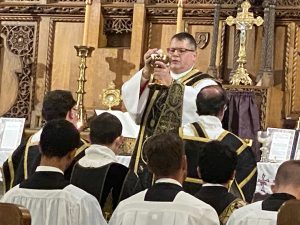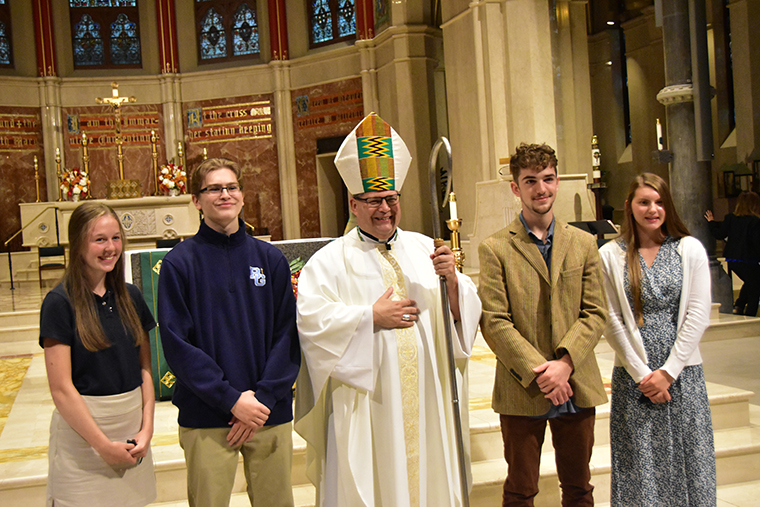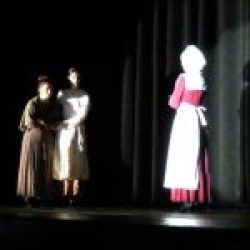Bishop Lucia is looking ahead as he celebrates his 3rd Anniversary
In our August 4 edition, we celebrated Bishop Douglas J. Lucia’s third anniversary (the official anniversary date is August 8th) as the Shepherd of the Diocese of Syracuse. This is Part 2 of the question-and-answer conversation between Bishop and The Catholic Sun.

Bishop Lucia celebrated the Requiem Mass at the Shrine.
SUN: In the follow-up to the Year of Vocations, how do you see your role at St. Margaret’s impacting the mission and how it might influence those discerning a vocation?
BISHOP: First of all, one of the more telling questions was when I asked Fr. Dennis Walker at the end of June to take another assignment in Cortland. He would be leaving my parish, St. Margaret, and St. Rose of Lima. They were both affected. People kept asking me, ‘Bishop, who is replacing him?’ Well, ‘nobody.’ And then they would ask, “Bishop, who is the pastor?’ And I would look at them and say, ‘I am.’ I said this to the people: ‘We are looking for vocations in our diocese, and here is my challenge. What if, on a yearly basis, we had one priest, or one religious, or even one deacon from our parish community? What would that do to what we are facing right now? That’s what it takes. People ask, ‘Well Bishop, how are you going to solve this problem?’ And I laugh because one person said to me, after a discussion of this, ‘Well, good luck!’ That’s why I really admire Fr. Jason’s (Hage, diocesan director of vocations) recent ‘Called by Name’ effort to bring forth names. I think it’s so important because if parishes are going to remain vital it’s because people come forward to serve the people.
Looking at the synod going forward, we need to expand the role of women in the Church. Some of our women are becoming Parish Life Directors along with deacon administrators. Also in the coming year, the roles of acolyte and lector are things we are looking at. I am not just talking about those who read at Mass or serving as extraordinary ministers of the Eucharist at Mass. We will continue to have those, but we will be seeking people to take these roles. We need to be sure that people are receiving Our Lord, especially if they are homebound, or providing for adoration in our churches. On the other side, as lector, how do we help people break open the Word during the week? Those are things I am looking at. That’s all part of the vocations picture. But another part, as we go to Rome (for the Synod on Synodality), is even the question of ‘Do we have some permanent deacons in certain areas of the diocese who would be able to be not just deacons but be a presbyter to that community and provide the sacraments that are needed. So those are all important things that I hope will be addressed by the synod.
SUN: The reorganization of diocesan offices relating to faith formation is happening currently under your watch; how do you see that helping in this effort for vocations and engaging people in ministry?

Bishop-elect Douglas J. Lucia (left) and Bishop Robert J. Cunningham share a laugh at a June 2019 press conference announcing his appointment as the 11th Bishop of Syracuse. (Sun archives | Chuck Wainwright)
BISHOP: It’s almost like what just happened with the promulgation of the new program for priestly formation. It’s interesting that now, at the very beginning of any program of study of formation for the ministerial priesthood, there is what’s called a propaedeutic year. The word means ‘getting back to basics,’ getting back to the Church’s catechesis. For me, what I find so refreshing, which has come out of the synod, is that we’re not just waiting. This reorganization of the office of formation, of catechesis, is really a response for, if I can use the term, a propaedeutic year or years for the families of our diocese. We are being called to get back to basics so that people learn the teachings of the Church from an early age and that these teachings come alive for them at all stages of life.
SUN: In your interview with The Catholic Sun last year, you spoke about the unfortunate historical issues regarding the Indigenous people of Canada and the suffering that occurred. As we talk this year, the Pope is in Canada to meet with these people.
BISHOP: I am very interested in the meeting. I am anxious to see where the Holy Father heads with this visit. It’s a very emotional visit in that I have learned a lot from my very limited interactions with the Onondaga Nation. They have taught me so much already. I’m very hopeful that the Holy Father’s message will be one that particularly, just as the Onondaga Nation has a treaty, the Wampum of the Two Paths, that somehow together we can walk. I think society has to be renewed. There is a great spiritual tradition among the Indigenous people. Again, it’s that connection with our spiritual roots.
SUN: With this happening within a year’s time, is it a sign that the Universal Church is listening more closely and is moving more quickly than perhaps we have seen in the past?
BISHOP: I would like to think that, I would hope, that the Church is trying to listen more and responding to people. I think we still have a way to go. There are challenges, and we have seen them come up concerning the liturgy, differing opinions on the liturgy and topics like that. I am just hoping, that with the approaching 60th anniversary of the Second Vatican Council, that somehow bridges can be built between the past and the future, and that together everyone can cross that bridge.
SUN: What are your hopes for the Eucharistic Revival during year four of your time in the Diocese?
BISHOP: Part of my hopes for this year is the renewed catechesis surrounding the Eucharist, that we come to a better appreciation of the Mass and of the real presence of Our Lord in the Eucharist. Also, as we heard in the Gospel for the Sixteenth Sunday, when Jesus is in the home of Martha and Mary and Martha is busy with so many things. She was showing hospitality, which is so important, but as Jesus said to Martha, ‘Mary has chosen the better part,’ meaning that we need to root our hospitality in our relationship with the Lord. We need to root what we do in church, in our relationships, in our prayer. To me, the phrase from Thomas Merton is often used: the idea that we need to be a ‘living prayer.’ There are different ways to express it. One of them is lex credendi, which is what we believe, which leads to lex orandi, or how we pray, which then leads to lex vivendi, which is how we live. These can be interchanged, but to me, it says that how we pray leads to how we live. How we pray and how we live should reflect what we believe.
SUN: Any closing thoughts?
BISHOP: Just that we need our
parish communities to be alive in the Eucharist. The Eucharist needs to be the center, the ‘source and summit’ of what we are about. That means we need to be alive in that. In this Eucharistic Revival, how do our parishes become more alive today, in our worship, in our lives and also in expressing our beliefs? As we go forward, we can’t just snap our fingers and have more priests, more deacons, more women in consecrated life. When retirements come next summer, we will have more retirements than we’ve had in years. We are going to have to be working together.






